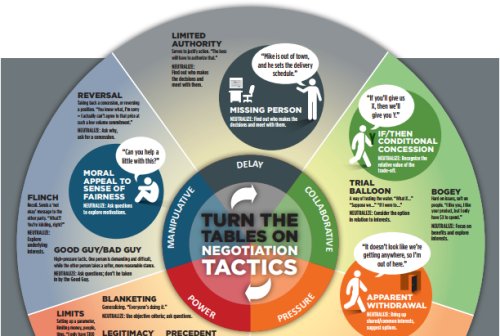When you negotiate with people who are angry, what strategies and tactics can you use to combat their anger?
There will be times when you will have to negotiate with people who are angry, for one reason or another. When you encounter such a person, the first thing you should try to do is establish the source of their anger. Are they angry with you because of the position or organization you represent? Do they feel as though they've received the 'short end of the stick' and think you played a role in their dilemma? Did they start their day by getting up on the 'wrong side of the bed?'
The reason it's so important to identify the source of their anger is so you can understand the mindset they possess and the reason they possess that mindset. Once you've determined the reasoning behind the adoption of their current position and the source from which it came, you'll have insight into how to alter their mental makeup. After understanding their mental makeup, you can employ the following 7 strategies ...
- Before the encounter, if possible, determine how you might address the situation. Gather information as to the source of the problem the other person has and why they are maintaining that position.
- Listen very intently to the nature of their concerns and don't interrupt while they are speaking. When you interrupt someone, you are literally saying, what you have to say is more important than what they are saying. In addition, you can't gather information while you're talking versus listening. Some people just want to be heard.
- Let the other person know you're really listening by reiterating what you've heard. State the fact that you're listening in the form of, 'So I'm sure I understand what you're saying, I'd like to reiterate what I've heard.' Convey empathy and genuine concern for their situation.
- Read the other person's body language, even if you're speaking to them on the phone. You can listen to the level of anger they possess. Some negotiators suggest you infuse humor into such a situation. My suggestion is 'go easy.' You don't want to exacerbate a situation further by being perceived as insensitive.
- Identify your position as it relates to why you and not someone else is negotiating in this situation.
- Highlight your authority to address their problem (note: Do not put yourself in the position of having the final authority of giving them what they want, until you're sure you can deliver what they seek and it's not to your detriment. You always want to have a 'back door' to escape through in case you can't deliver the ultimate request they're making.)
- Change the pace of the conversation. If the other person is screaming, acknowledge your perception of their state of mind and speak in a softer tone. If they are speaking fast, you should speak slower. What you're attempting to do is change the tone, pace, and speed of the conversation. By doing so, you will start to alter the mental state of mind the other person possesses.
If you've learned how to interpret body language, even if you can't see the other person (if you want/need more information on how to read body language, send me an e-mail), you'll gain insight into how their perception and emotional state of mind is changing. If you're negotiating face to face, determining their mental level of anxiety becomes invariantly easier. Suffice it to say, when you negotiate with an angry person, display empathy, an understanding of their perspective, and the willingness to address their concerns ... and everything will be right with the world.
The negotiation lessons are ...
- When negotiating with an angry person/people, let them talk. Go the 'extra mile' to understand their source of irritation and let them know you're trying to work with them to solve their problem.
- Determine if they are using anger as a tactic to manipulate you into getting what they want. If you determine they are using anger as a tactic, let them know that you are 'on to their game.'
- While trying to assist the angered person to achieve what they seek, keep your own goals for the negotiation in mind. Be sure to set boundaries, so the other person knows, as early in the conversation as possible, that you will assist them, but not to your disadvantage. Always be willing to walk away from a situation and incur the consequences, if you can't agree upon an equitable outcome.
